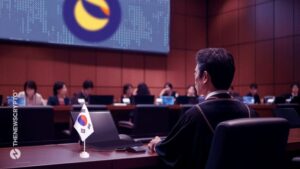
- Prosecutors allegedly sought to take more than $100 million in Shin’s assets in November.
- U.S. authorities disagree with the Korean court’s assessment that LUNC is not a security.
The South Korean Court has decided that Terra Classic (LUNC), the rebranded native token of the Terra network that spectacularly collapsed last year, is not a security.
Apparently, the Seoul Southern District Court found once again on February 16 that “it is difficult to see LUNC as a financial investment product regulated by The Capital Markets Act,” as reported by the local news portal Ilyo Shinmun today. The court made its decision on November 15; however, the news organization did not make either decision public until today.
According to the report, the court’s decision means that South Korean prosecutors will not be able to take any of Shin Hyun-Seung’s (aka Daniel Shin) assets.
U.S Regulators Disagree
For his part in the collapse of the Terra ecosystem, prosecutors allegedly sought to take more than $100 million in Shin’s assets in November. The assets must be restored to victims of the Terra collapse, hence the court has apparently denied the plea for forfeiture.
Prosecutors have twice sought a ruling from the Supreme Court of Korea (on March 20 and Apr. 14), but the court has yet to provide a ruling. On the other, Terraform Labs co-founder Do Kwon was arrested earlier in Montenegro and is facing documents forgery charges. Both the U.S. and South Korean authorities have requested extradition.
U.S. authorities disagree with the Korean court’s assessment that LUNC is not a security. The U.S. Securities and Exchange Commission (SEC) filed a lawsuit against Terraform Labs and its co-founder, Do Kwon, earlier this year for their roles in the collapse of the Terra tokens. Back in the day, LUNC was classified as crypto asset security by the SEC.















